Achievement list
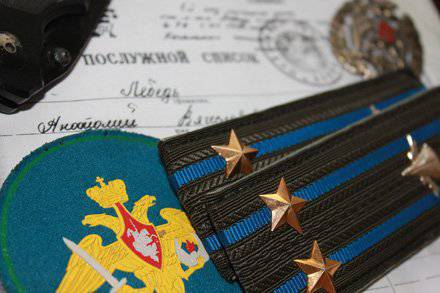
It often happens that the awards do not find their heroes: award awards are lost, personnel officers are mistaken, the situation in the unit changes. It happens that they award not those who showed themselves on the battlefield, but those who are closer to the headquarters or an important boss. It happens that a feat is forgotten or the feat has no witnesses left. Anything can happen, this is life. But, fortunately, it also happens that the star falls on the chest deservedly, in a timely manner, precisely to the one who committed the act, which should be noted.
Deed recorded by time becomes history. From the stories formed chronicle. A chronicle consists not only of the dates and places of battles, the number of dead and wounded, but also of the names. Names of heroes worthy of memory for centuries.
27 of April of this year, Hero of Russia Guard Lieutenant Colonel Anatoly V. Lebed died in a traffic accident. One of the most famous and famous paratroopers of our time. Cavalier of the Order of St. George IV degree, three Orders of Courage, three Orders of the Red Star, Order of Service to the Motherland in the Armed Forces of the USSR III degree, medals "For Distinction in Military Service" of three degrees, courageous, decent, honest person.
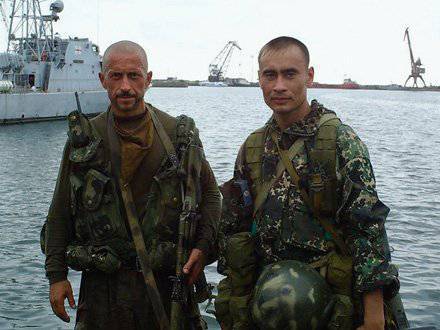
His colleague - one of the senior officers of the 45-th separate Guards Orders of Kutuzov and Alexander Nevsky of the special forces regiment of the Airborne Forces tells about the hero's combat path.
- Anatoly was born - the youngest son in the family - May 10, 1963, in the city of Valga, the Estonian USSR, in a working-class family. His father, Vyacheslav Andreevich, was a front-line soldier, a marine, a participant in the Battle of Stalingrad, after being transferred to the reserve, was sent to the virgin lands in Kazakhstan, then moved to Estonia.
Anatoly was proud of his father’s military past, told about his hand-to-hand fighting with the fascists, the fight against saboteurs, about the bayonet wound to the neck and fighting partnership, thanks to which his father remained alive: the bleeding friends and Vyacheslav Lebed were bleeding from the battlefield.
While studying at vocational school No. 11 of the small old town Kohtla-Järve, Anatoly, a Komsomol member, athlete and activist, was engaged in parachuting at the local DOSAAF school. By the end of the technical school on his account was about 300 jumps!
Sky magnet guy in their vast spaces, but an attempt to enroll in Borisoglebsk flight school suddenly ended in failure, Tolik filled up the math. I had to get a job as a mechanic at the Akhtmensky mechanical repair plant, whence 3 in November 1981, he was called up for military service. The military took the oath on December 20 in the training manual of the 44-th training division of the Airborne Forces, in the village of Gaizunai, Lithuanian SSR. Then, in the position of commander of the squadron - commander of the combat vehicle, he served in the 57-th separate assault landing brigade in the village of Aktogai Taldy-Kurgan Oblast, Kazakh SSR.
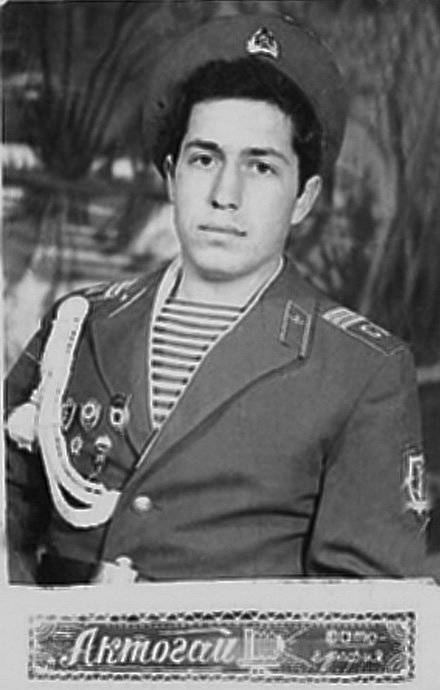
In the summer of 1983, Sergeant Lebed decides to become an officer and enters the Lomonosov Military Aviation Technical School (a suburb of Leningrad), specialty: helicopters and aircraft engines. 27 Jun1986, Anatoly's youthful dream came true - he became a lieutenant.
Distributed it in the 307 th helicopter regiment ZabVO. It was not necessary for the Mi-24 on-board aircraft to freeze for a long time there;
The 239-th separate helicopter squadron of the Air Force 40-th Combined Army took into its ranks a low, but extremely physically developed flight engineer of the Mi-8 25 April 1987.
People far from military science, being impressed by a couple of movies, think that a flight engineer is such a half-drunk ensign who peacefully slumbers in flight, and when he wakes up, pushes sluggish paratroopers from the board to the ground. It's a delusion. In flight, each crew member is busy with his own business. Bortekhnik monitors the performance of the systems of the machine, monitors fuel consumption and the operation of pumps, sensor readings on the dashboard. And when the helicopter hovers over the landing area, the first flight engineer is the first to go down from the side! He is obliged to see the ground on the site, assess where the wheels will stand, consider the danger of damage to the pinwheel.
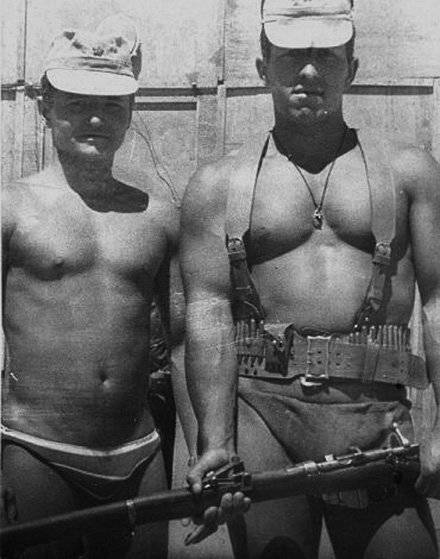
Swan, called Rambo in the squadron's eyes, always landed first. And left in the landing group in battle. For a year and a half in Afghanistan (with a five-month break), Lebed participated in the evacuation of the wounded, searching for and destroying caravans with weapons from the air, the seizure of ammunition and equipment of the enemy in ground operations. I think it was in Afghanistan, by participating in the destruction of gangs and caravans in the mountains and Zelenka, he learned that it was so useful to us later in the Caucasus.
They say: the strongest are lucky. And Anatoly was lucky, he flew with Nikolai Sainovich Maydanov, the future army legend aviation, nicknamed the army team "pilot from God." The only combat pilot in the country awarded the title of Hero of the Soviet Union and Hero of Russia (posthumous). Maidanov’s crew took part in landing operations in the areas of Panjshir, Tashkent, Dudu Mazar-i-Sharif, Ghazni, Jalalabad. During this time, he landed more than 200 intelligence groups. Mujahideen were hunting for Maidanov’s crew, “Stingers” got into their helicopter twice, shot their sides and blades several times, but it did not fall. Fellow soldiers and paratroopers knew: if Maidanov’s crew is in the turntable, you can be sure that everyone will return alive.
In the afternoon of May 12 of the year 1987, having taken on board the inspection group of the Barakinsk Special Forces (668-th separate special-purpose squad), the crew of Maidanova circled along the route Padhabi-Shana-Charh-Altamur-Sepest. Is empty. Returning home, they flew through the village of Abchakan, and then officers Yevgeny Baryshev and Pavel Trofimov noticed two mojaheds on horseback in the direction of the arm. Probably not far, in Zelenka, a caravan was hiding. The commandos decided to parachute and join the battle.
Having landed a reconnaissance group of 13 people, helicopters (a pair of Mi-8 and a pair of Mi-24) made two rounds each and, having fired on a canyon and brilliant green from all onboard armament, left for help. A little more than an hour was needed to refuel the turntables, the charges of the reserve group and on the way back to the battlefield. An armored group pulled up to the gorge, army aviation also helped: the Su-25 couple dropped bombs in the Abchakan gorge and “worked” along the nearby Dubandai gorge.
As the agents later found out, the number of a detachment of dushmans who had a caravan repulsed was up to one hundred people. They led a caravan from Pakistan. On this day, the caravan rested and stood unloaded in Zelenka of the Abchakan riverbed.
Hard fight ended after midnight. The next day, the weapons and ammunition left from the dushmans were taken out by several helicopters. In total, according to some data, it was destroyed and captured 255 pack animals to 50 Mujahideen, 17 man-portable air defense systems "Hunin-5», 5 launchers rockets, 10 mortars, recoilless rifles, 1-GU, the ANC, about 2,5 thousand ammunition for launchers, heavy weapons, mortar mines, 350 anti-personnel mines and hand grenades, more than 300 kilograms of explosives, over 300 thousands of cartridges.
From Afghanistan, Anatoly returned to the Magochinsky District of the Chita Region, but soon flew off to the Western Group of Forces, to the German city of Magdeburg, where he successfully served until the withdrawal of Soviet troops from Germany.
In October, the 1993 of the year, the 337 th separate helicopter regiment, on the basis of a directive of the Russian Defense Ministry, was transferred to the Siberian Military District, to the city of Berdsk, Novosibirsk Region.
The great Soviet Union collapsed. The armed forces went into decline, it became uninteresting and unpromising to serve. The salary was not paid to the military for half a year, there was no own housing. What could be combat training, when the fuel for the flight was not for months and the takeoff was overgrown to the waist?
October 1 1994, Anatoly issued a pension and, together with his wife Tatiana and son Alexei, moved to a cozy suburbs. On bread earned in the local veteran organization of soldiers-internationalists. Then, unexpectedly, he left the adjusted life and volunteered, on a tourist visa, went to the former Yugoslavia, to help the Slavic brothers in their right business. What exactly Anatoly did in the Balkans, he never told, answered dryly: “Serbs are not strangers to us, he fought for the Motherland”. The first Chechen campaign missed for personal reasons.
In August, 1999, after an attack by Chechen militants and foreign mercenaries on Dagestan, a large group of volunteers who are ready to defend the integrity of the Russian state, from all the outskirts of the country reached for the Caucasus. It was a right thing, but we always have enough patriots, thank God.
Lebed with Igor Nesterenko, with whom he became close friends in the Balkans, bought equipment and uniforms, flew to Makhachkala, where they joined the local militia, and went to the mountains. In the course of hostilities, they joined the joint militia detachment, which included fighting until October. When the militants were forced into Chechnya and the army crossed the border, friends signed a contract with the Ministry of Defense and returned to the war again. Anatoly served as deputy commander of the reconnaissance group 218 of the separate special-purpose battalion of our regiment for more than half a year. In the future, in whatever rank he was and whatever position he held, he continued to perform combat missions as part of reconnaissance groups, personally taking the fighters to reconnaissance and search activities.
Saratovets Igor Nesterenko died at the military exit on the first of December 1999 in the area of the city of Argun, on the railway embankment he ran into an ambush with the guys from the infantry, and Lebed continued the work with double energy. It was then that I met with Senior Lieutenant Lebed. He struck me with his fanaticism and unconventional approach to business. He searched for the enemy where he was not usually sought, and climbed to places where people usually did not climb for security reasons. And in fact, he always found and carried out the task in such a way that the commanders had nothing to criticize the “free-thinker”.
I asked him why he climbed back to the war, why he was cold in the mountains and risked his life, because he gave his “duty to the motherland” in Afghanistan.
“If a gangster picked up a weapon and kills, appropriates someone else's, it must be destroyed immediately. Yes, here, in the mountains, otherwise he will feel impunity and will come out to rob in the center of Moscow. Action must know: did evil, hide will not work, we will find, and he will have to answer in an adult way. You understand, the more we push up at the top, the less they will go down to the cities, ”answered Lebed.
In 2001 – 2003, we effectively worked in the Vedeno district of Chechnya. Our area of responsibility included the villages of Khatuni, Elistanzhi, Makhkety, Tevzana, Agishty. The scouts from the Tula division of the Airborne Forces and the special forces of the Ministry of Internal Affairs and the UIN actively contributed to our combat work. By common efforts, the most gangster region of the republic slowly turned into a number of peaceful ones. The shelling of the columns and posts ceased, the militants preferred to hide high in the mountains and descended on a rampage on the plain only when the hunger was sticking to the wall.
Somehow, after a daring attack by militants on the outpost and undermining a police convoy near Selmentauzen, Tolik and I got a “flop”: where can I quickly find the attackers and make the result without losses? Swan and his “lepish friend” took their reconnaissance group to the forest, and soon brought evidence of the destroyed base along with its militant masters, while I and my guys quietly disarmed and captured seven gangsters in the village itself. They went down there to wash off, relax, and sit out while they were being searched in the mountains, but instead of a bath they got into the troop compartment of my armored personnel carrier. So, by joint efforts, we with Comrade Lebed completely neutralized a large gang and gave good “food for thought” to special forces and military prosecutors.
At noon 25 on June 2003, the reinforced reconnaissance group, which included Lebed, discovered a well-fortified militant base, which was located in a mountainous and wooded area above the notorious village of Ulus-Kert, on the descent to Argun Gorge. The militants were destroyed, the base was blown up. Later in the evening, while cleaning the territory adjacent to the base, Swan blew up on an anti-personnel mine: he received a mine-explosive injury with a traumatic separation of his right foot, an extensive defect of soft tissues, 1 degree shock and acute blood loss of up to one liter.
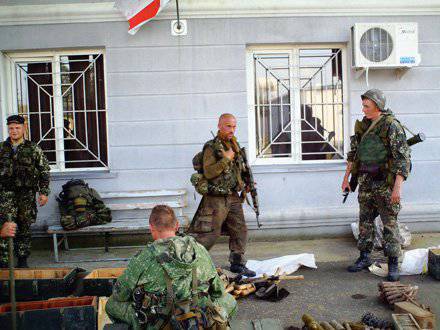
To evacuate the wounded man they called a pinwheel, and before the landing site, which was a few hours away from the place of operation, the soldiers carried their comrade in their arms. Saved, as once Vyacheslav Andreevich at Stalingrad.
For a month and a half, Anatoly was treated at the Burdenko Hospital, received a prosthesis. He just got up and started walking, he immediately left the hospital and flew back to Chechnya. Do not quit. And go to the fighting! “The prosthesis is as good as living. Ready to carry out any tasks! ”- the slightly scrawling reconnaissance officer reported to Khankala, and the command did not object, returned to the battalion.
The fact that the prosthesis in Chechnya often broke down, and Lebed repaired it with the help of scotch tape and improvised fastener material, and again went to the fighting, not a beautiful fairy tale, but I confirm that I witnessed the witness of his magical works with the prosthesis.
In December of 2003, we participated eleven days in an operation to eliminate Ruslan Gelayev’s gang, who shot 9 border guards from the Mokok outpost in Dagestan and captured the village of Shauri and Gagatli in snow-covered mountains. Leaving on retribution, Gelayev divided the gang into small groups and tried to infiltrate into the Akhmetovsky district of Georgia, but a large-scale military operation involving artillery, aircraft and special forces sent the Black Angel to hell.
In August of next year, we celebrated the Airborne Forces Day beautifully, on combat exits, 5 August destroyed at the foothills five militants, two of whom found certificates of local security forces officers issued to them 2 August in Grozny.
9 January 2005, the watch group of the Swan reconnaissance group was ambushed. Two fighters were injured. When the militants tried to capture them prisoner, Swan with a machine gun at the ready counterattacked the gangsters and, having destroyed three, forced the rest to retire. The wounded were promptly evacuated to Khankala, assisted.
At the next operation, 24 in January, Anatoly received a light shrapnel wound, but did not leave the battlefield, continued to command the group, led his fighters out of the fire, and personally destroyed three more militants. As a result of the operation, the militants' base, packed with ammunition and food, was blown up, and one of the killed bandits, according to records found at his place, turned out to be connected by Shamil Basayev.
By decree of the President of the Russian Federation on April 6, 2005 for courage and heroism shown in the performance of military duty in the North Caucasus region, guard captain Anatoly Vyacheslavovich Lebed was awarded the title of Hero of the Russian Federation with the award of the special distinction - the Gold Star medal (No. 847) . Russian President Vladimir Putin, awarding Anatoly, called him one of the guiding stars of the country.
In August, 2008, after the attack of the Georgian army on Tskhinvali, we, together with paratroopers from Novorossiysk and Stavropol, moved to perform combat missions on the Georgian-Abkhaz border. In the event of an enemy attempting to cross the border, we had to find and neutralize their advanced units, gather intelligence, sabotage, and so on, in general, do what Airborne Intelligence should be engaged in.
All tasks we have successfully completed. Unfortunately, it was not without a loss. On August 10, while undermining an armored troop-carrier, a junior sergeant Alexander Sviridov was killed by a mine near the Inguri river, one officer was injured. An armored troop-carrier dropped it into the gorge, into the water, it saved those sitting on the armor. The driver flew into the open hatch and survived; his hands then shook for two days, barely reassured. A few days later, a soldier and an officer from the Novorossiysk regiment died in a similar situation.
First we captured the military base in Senaki. 14 August managed to take the port of Poti, where the ships of the Georgian Navy were based. 8 ships were blown up by us in the raid, their outposts ran in panic. 15 high-speed amphibious assault boats, 5 armored Hummers, which were intended for trips to President Saakashvili’s front, and therefore equipped with appropriate controls, navigation and closed communications, 4 thousands of small arms, a huge amount of ammunition and medicine became trophies.
Much later in the regiment, examining and discussing the course of the war, I agreed with Tolik that for the victory the Georgians did not have the most modern equipment and weapons, excellent communications and electronic warfare, fashionable equipment, they needed the spirit of a warrior who comes with victories. Overseas instructors and powerful physical training will never help in real combat, if there is no character and will to win. Despite a lot of problems, we won, first of all, thanks to our character, tempering, mutual assistance and experience gained by many years of climbing in the mountains in Chechnya ...
In Georgia, there was one good episode where Lebed proved to be a competent strategist. The detachment of our regiment was divided for two different tasks. I went with the part of the personnel to the first point, Anatoly with two groups on two armored personnel carriers - to the second.
Armored personnel carriers enter the area fenced off from all sides by walls and brake. All the guys are sitting on the armor on top. Barrels of machine guns look at the sky, no one expects trouble, Georgians and does not smell. And - once, nose to nose, in the ratio of one to one, 22 Georgian special forces, in a reinforced position, deployed in a semicircle in a chain, ready for battle. Shreds jumping from armor and shouting: “Commander, come out to me, let's talk,” rushes towards the Georgians. Another officer is in a hurry after him, in any case translating his call into Georgian. The Georgian commander comes forward. They are talking. Shreds admonish the enemy not only with a formidable look and a stern voice, but also with a weapon, demonstrating that in the event of something, he will not just easily part with life, but will also gladly take with him a dandy Georgian officer. At this time, without losing a single second, our guys dismount, enter the flanks of the Georgians, click the bolts. The swan, assessing the situation that has changed polarly within a couple of minutes, ends its dialogue with the words: “Commander, you are surrounded, in order to avoid bloodshed - give up, and we guarantee your life.”
The Georgians surrendered, without a single shot, laid down their arms. And all remained intact. And our, and the enemy. But they could shoot each other, if it were not for the lightning-fast Lebed’s correct reaction to the situation.
You see, this case absolutely does not fit into the image of a “man of war” imposed on Lebed by the newspapers, ready only to shoot, destroy and destroy. This case shows that Tolik was all right with common sense and tactics, and here he won precisely with the ability to act outside the box and take advantage of the most disadvantageous situations. And yet, Tolik was a Soviet man, he lived and served in a country where everyone, regardless of nationality, was a brother to each other.
Yes, during the years of service, various officers of our regiment with Anatoly were “float”, smoothly only on paper, but not at war, they raised their voices, and grabbed each other’s breasts, proving that they were right, but everyone recognized his deed as reasonable and heroic at the same time, shook hands, thanked, took off his hat to his resourcefulness. And Tolik, well done, noted the timely and accurate actions of the detachment that chose the only correct course of events ...
In the evening of April 27, 2012 in Moscow in front of the gates to the Sokolniki Park, at the intersection of Bogorodskoye Highway and Oleniy Vul Street, Anatoly Lebed did not manage his Kawasaki motorcycle, crashed into a massive concrete curb, and died as a result of injuries.
Ten years in hot spots, under a thousand parachute jumps, and suddenly, a ridiculous accident three steps from home. He himself was the master of his luck in battle, and in civilian life he was just as vulnerable as any other civilian. Maybe so. But few people know that the "old woman with a scythe" has already come for him this year. During a group jump from 4000 meters, while in free fall, one of the officers at high speed hit Anatolia from above and broke his collarbone. The swan flew down with a stone, it was not possible to pull out the manual disclosure link and open the dome, the hand did not obey and did not move. With an incredible effort of will, Tolya managed to reach out and pull out the ring with his good hand: he opened the reserve parachute seconds before the tragedy, but couldn’t control the canopy with the help of control lines, he needed both hands, so he hit the ground hard, rolled head over heels, the prosthesis flew apart , but in general - lucky.
We buried Anatoly in the Alley of Heroes of the Transfiguration Cemetery. Among the many famous and unknown heroes of the last wars, Commander of the Airborne Forces Hero of Russia Lieutenant-General Vladimir Shamanov and President of the Republic of Ingushetia Hero of Russia Yunus-Bek Yevkurov came to bid farewell to the legendary lieutenant colonel.
“The military fate of Anatoly Lebed is an example of selfless service to the Fatherland, loyalty to military duty. He was a brave officer who knew no fear in battle. For our troops, this is an irreparable loss, ”said Shamanov.
“Anatoly Lebed was a real soldier, a soldier with a capital letter. He appreciated a worthy opponent, appreciated friendship, loved subordinates, was never a showman, ”Yevkurov noted.
And they are right, both ...
... We talk about Anatolia more than half the night, watch photos and videos, scroll through the track record, discuss combat operations and parachute jumps from various heights. My interlocutor notes that Lieutenant Colonel Lebed defiantly was not interested in politics, did not like to talk about it, refused various invitations to participate in political events, called on other military men to silently do their work and not get involved in the debate.
Watching one of the latest videos, where Anatoly leaves the IL-76 in a good mood and, smiling, flies under the black dome of a parachute with a bright red star, you understand how powerful this person possessed. Despite domestic problems, injuries, not the youngest age, the strength in him was a dozen special forces. Only in the eyes - light sadness and fatigue.
“Everyone has his own fight in life, someone has already had it, someone else is ahead,” Anatoly used to say. - When it comes to business, Motherland becomes a vague concept. Then they say: they fought for the Motherland, and so it will be in reality. But at that moment everyone is fighting for himself and for those who are near. You fight because you have to win. And the Motherland - these are the fifteen people that are near, shoulder to shoulder. Those who felt it would understand me. ”
For the airborne forces!
Vlad, a special forces veteran friend of Anatoly Lebed, shared his thoughts with me:
- I want the memory of Tole to be not only as about Rambo in orders. A lot of orders of the bearers - there are few men. And Tolya was not only a warrior with a capital letter, but also correctly looked at things that are happening in the world and in the country. I always gladly agreed to take part in patriotic events with children, we recently held several such meetings, deeply shared the idea that the real and most important war is not with an automatic rifle in hand, but for the hearts and souls of children. Therefore, it was very rare to see him at some pompous or secular paramilitary parties. In his free time, if it appeared, he tried to be where he was more useful and necessary, tried to pass on his experience to the young, he categorically rejected the role of the “wedding general”. From his military qualities, I want to note that he was always ready to listen to the experience of others, to learn, to comprehend. Walking the war with Ponte is not about him.
Tolya was a good comrade in the war and a true friend in civilian life, not an insensitive superman, as some people try to present him, but a wonderful person with a fine mental organization, but at the same time - a real peasant, soldier, son of his Motherland.
Tolik both lived and died at speed. The soldiers are alive, as long as they are remembered. Anatoly Lebed will live forever!
Information